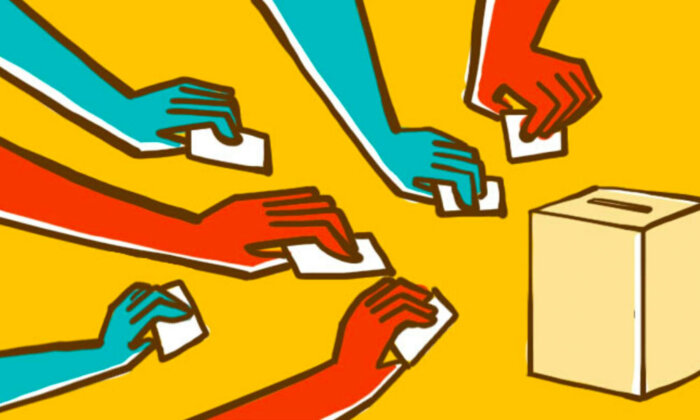American Democracy Is Less Broken Than You Think

It’s hard not to feel pessimistic about America right now. Politics are polarized. Corruption abounds. Factual reporting is being drowned out by fake news and media bias. Race relations are downright toxic. If you were to judge by social media posts or media punditry, you would think that America is at its nadir. But that’s just not true. If media bias, corruption, racism, and polarization spelled the doom of America, we would have been destroyed long ago.
By some metrics, political polarization certainly appears to be increasing. But polarizing conflicts have been around since our inception. During the American Revolution, people who remained loyal to Great Britain were attacked in the streets, stripped of their property, and many forced into exile. Long before President Trump called for a change in libel laws, John Adams oversaw the passage of a series of acts that made it a crime to criticize the government. In the run-up to the Civil War, a U.S. Senator was beaten half to death with a cane by a congressman on the floor of the Senate — and not only was the congressman never charged with a crime, he was reelected and supporters sent him replacement canes in the mail. During the 20th century, there was a little less tension — except of course for when the political parties accused each other of being anti-American communist sympathizers, or wanting to start nuclear holocaust (as did Lyndon B. Johnson’s infamous “Daisy” political ad).

Corruption and brutality, too, have been a problem as long as there has been government. In Texas during the mid-1800s the Texas Rangers’ role in killing and stealing from Native Americans and Mexicans to clear areas for white settlement led to an unsuccessful effort to disband them. Before being named FBI director, J. Edgar Hoover was tasked with organizing the arrest of roughly 10,000 people across the country for the “crime” of attending anarchist or communist meetings. Many of those arrested were beaten and held in unsanitary conditions. Just a few years later, in the early 1920s, Warren Harding’s administration was embroiled in the Teapot-Dome scandal, in which it was revealed that the Secretary of the Interior was receiving kickbacks for offering good deals to private oil companies.
Long before President Trump called for a change in libel laws, John Adams oversaw the passage of a series of acts that made it a crime to criticize the government.
Fake news was prevalent even at our country’s founding. Alexander Hamilton and Thomas Jefferson — whose political rivalry established the first generation of American political parties — controlled most of the prominent newspapers of their day, and would use them to spread rumor and innuendo slandering the other’s character. The New York Herald sparked panic across New York City in 1864 when it fabricated a 10,000-word story about animals escaping the Central Park Zoo and mauling innocent bystanders. There are countless examples like this; one doesn’t have to look further than the “yellow journalism” of the late 19th century to find exaggerated reporting and shocking headlines designed solely to attract more eyeballs.
And while social media is peppered with claims that Donald Trump is the most racist, sexist, and bigoted president in history, he is hardly the first with a controversial record on race and gender. Even LBJ, who’s hailed as a civil rights hero, was a proud womanizer who regularly used racial slurs. Woodrow Wilson hosted a White House showing of “The Birth of a Nation,” an explicitly pro-KKK film. Lincoln may have helped end slavery, but he also forcibly removed more than one Native American nation, and failed to hold soldiers and bureaucrats accountable for the destruction of Native American lives and communities. Many of our founding fathers owned slaves, believed that Native Americans were less human than white people, and openly laughed at the idea of women’s equality. Racism and sexism, like corruption, partisanship, and fake news, are by no means recent problems.
Racism and sexism, like corruption, partisanship, and fake news, are by no means recent problems.
The history of democracy is a story of ignorant voters making questionable decisions, and unqualified elected officials implementing abysmal policies. And yet, by every measure of well-being that has ever been studied, citizens of democracies are doing better than any other form of government. We live longer. We have more wealth. We are better educated. We are safer.
This is the fundamental paradox of democracy — the inputs to democracy are terrible, but the outputs are great. Yes, inequality, poverty, and crime still exist, but that is true of every society. No society is perfect, but democracies are less imperfect.
America relies on a system of government that is capable of incorporating a variety of adverse viewpoints, biases, and even tragedies, and melding them into a functioning society. In autocracies, conflict and change are bad because they risk the power of those in charge. In a democracy, conflict and change are good because they allow for citizens to evolve our country without destroying it. We can post videos about the most horrific aspects of our society and then protest about it in the streets, and democracy is better off for it. We are able to express our outrage without having to resort to violence, and we can change the very nature of how we, as citizens, relate to the agents of the government (be they politicians, police, or bureaucrats) through democratic processes. Indeed, as we write in our book “Democracy Despite Itself,” the brilliance of democracy does not lie in the people’s ability to pick superior leaders. It lies in the many ways that it subtly (and not so subtly) encourages the flawed people and their flawed leaders to continually work toward building a better society.
The true threats to democracy come from violations of the democratic norms and procedures that allow society to self-regulate and allow citizens to have a voice.
The true threats to democracy usually have little to do with the actions of any individual (even the president) or any particular event that might cause public turmoil. The true threats to democracy come from violations of the democratic norms and procedures that allow society to self-regulate and allow citizens to have a voice. President Trump’s offensive tweets, deceptive claims, and controversial policy initiatives do not harm American democracy nearly as much as his refusal to cooperate with Congressional investigations, his attempts to silence dissent, or his attempts to disenfranchise voters.
American democracy is far from perfect. But those imperfections are not the result of Donald Trump, or partisan gridlock, or identity politics, or fake news, or any other supposedly modern phenomenon. American democracy is imperfect now because it has never been perfect in the past. No country or government has ever been perfect, nor will it ever be. But hope remains, because we, as a democracy, have the ability to improve our society through protest and debate and without violence or civil war.
And that is a beautiful thing.
Danny Oppenheimer is a professor of psychology and social and decision sciences at Carnegie Mellon University. Mike Edwards holds degrees in political science, history, and teaching, and has written extensively on politics and the media. He now teaches high school history in Boston. Oppenheimer and Edwards are the authors of “Democracy Despite Itself.”



